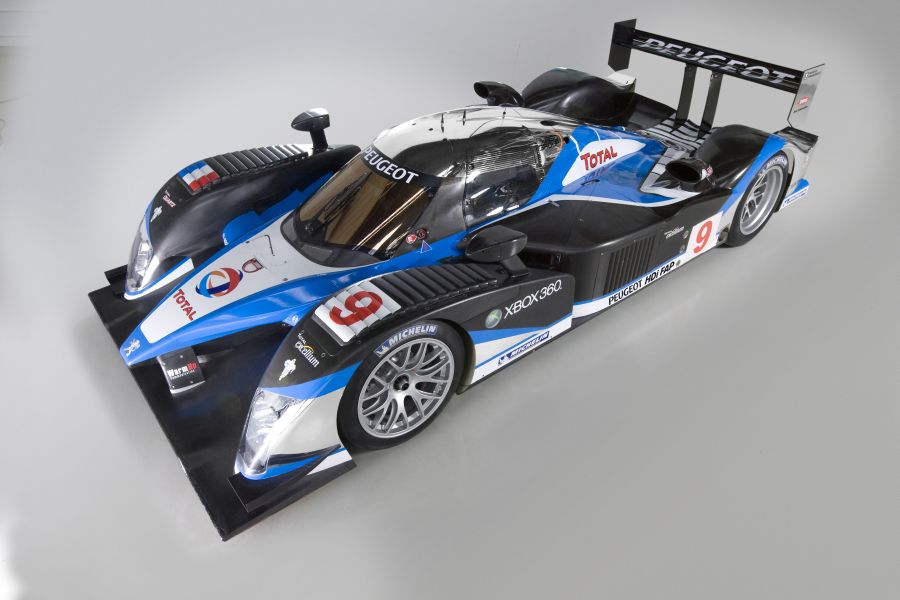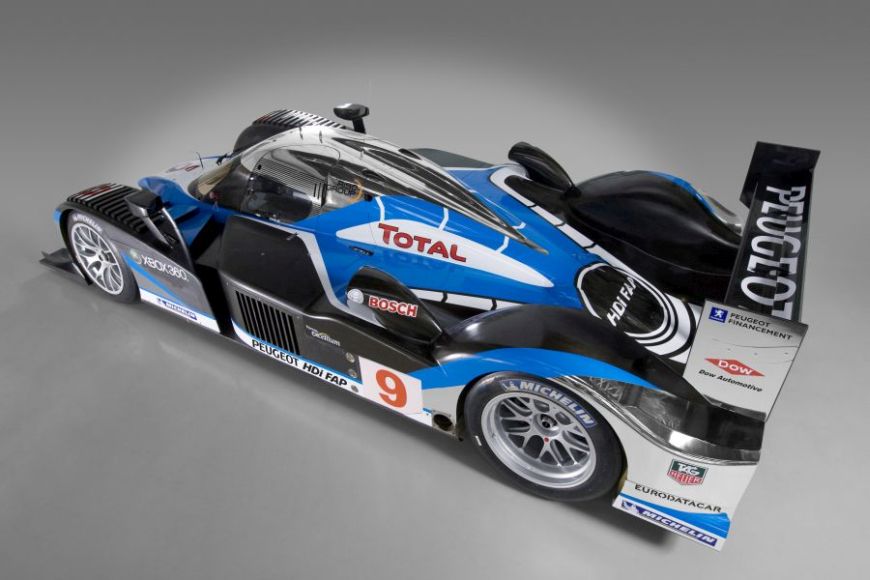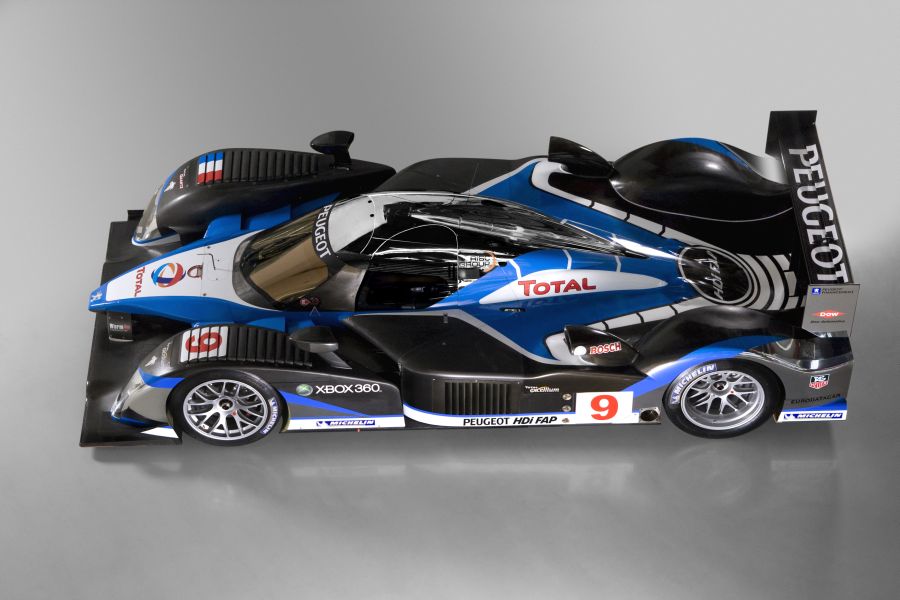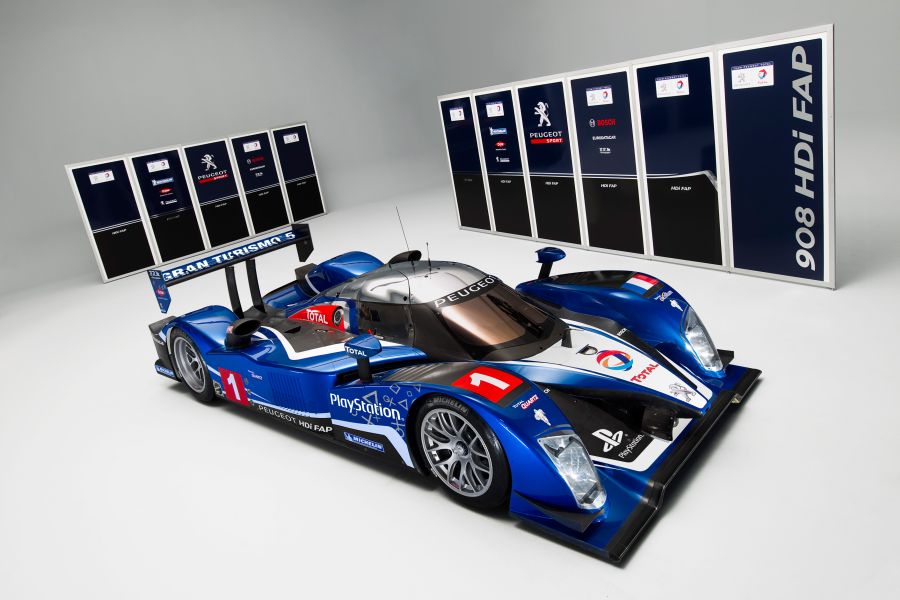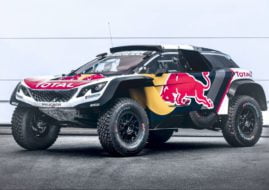Peugeot 908 HDi FAP – French Diesel Power for Le Mans Victory
The Peugeot 908 HDi FAP is a sports prototype race car used by French manufacturer Peugeot and private teams in the endurance races, including 24 hours of Le Mans, between 2007 and 2011.
After scoring podiums at Le Mans in the first two years of competition, 908 HDi FAP gained its biggest success in 2009, by scoring a 1-2 victory at world’s greatest endurance race. It was the third and last victory for Peugeot at Le Mans after Peugeot 905 did that two times in 1992 and 1993. In America, 908 HDi FAP was a victorious car at Sebring 12 hours two times, in 2010 and 2011.
Second diesel-powered car in endurance racing history
Peugeot 908 HDi FAP, powered by 5.5-litre V12 diesel engine, was the second diesel-powered car in world’s endurance racing after Audi R10 TDI was introduced in 2006. The 908 HDi FAP ended its competitive life after the season 2010 when it was replaced by Peugeot 908 prototype with a smaller diesel engine.
Peugeot started a development of a closed-cockpit LMP1 prototype in summer 2005, unveiling a car at Paris Auto Show a year later, in September 2006. The first public test followed in January 2007 at the Circuit Paul Ricard.
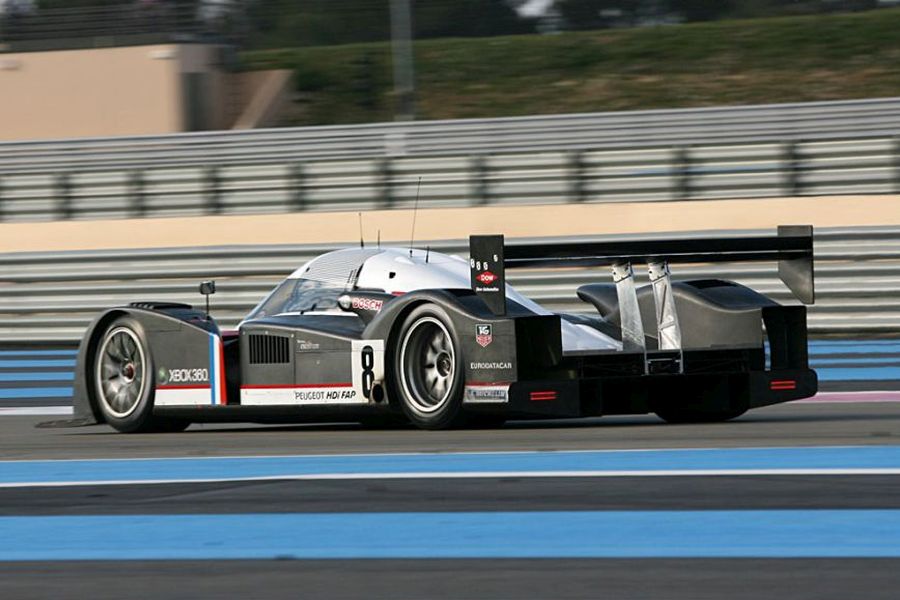
Peugeot 908 HDi FAP debuted in 2007
First closed-cockpit prototype since 2003
Unlike its diesel-powered rival Audi R10 TDI, Peugeot 908 HDi FAP was a closed-cockpit race car, the first such a Le Mans Prototype car since Bentley Speed 8 between 2001 and 2003. Peugeot explained such a decision with better chassis rigidity, better aerodynamics and a use of larger air restrictor.
Peugeot’s cockpit used a unique two-part door system with the upper part of the door swinging forward and out with a hinged plate forming the lower part of the door that can be either swung out or removed completely.
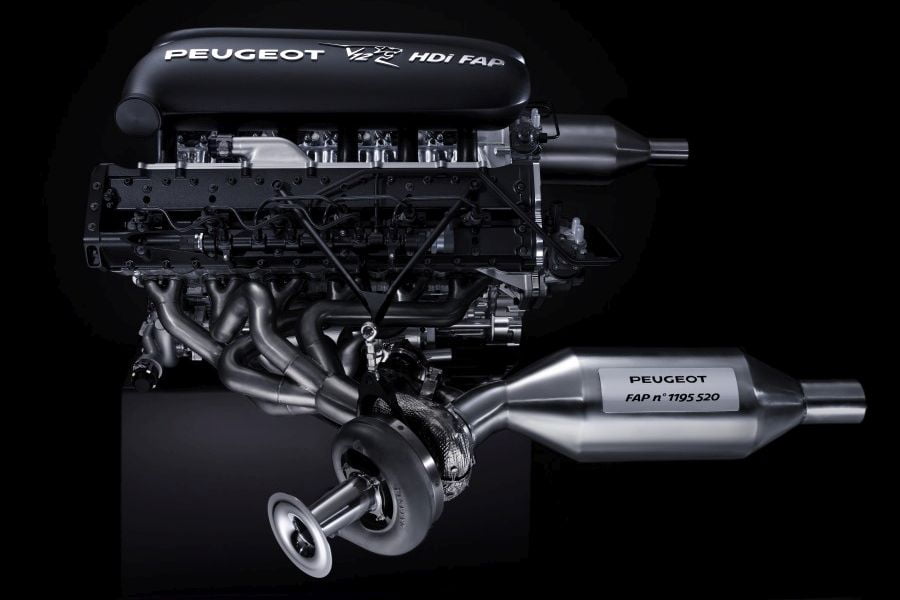
Beauty from outside, a beast inside – V12 HDi engine
5.5L V12 Peugeot engine gave much power than Audi’s
The body of a car was a carbon fibre monocoque with longitudinally mounted 5.5L V12 engine in the middle, with FAP particulate filters added. Audi was also using a 5.5L V12 engine in the R10 TDI, as it was the maximum size allowed by LMP rules.
Peugeot’s engine, with a help of two turbo chargers, was producing 730 hp and 1200 Nm of torque, nearly ten percent more than Audi’s car. Peugeot was using Ricardo’s 6-speed sequential gearbox. The car measured 4.65m of length and 2.00m of width, weighing 925 kilograms.
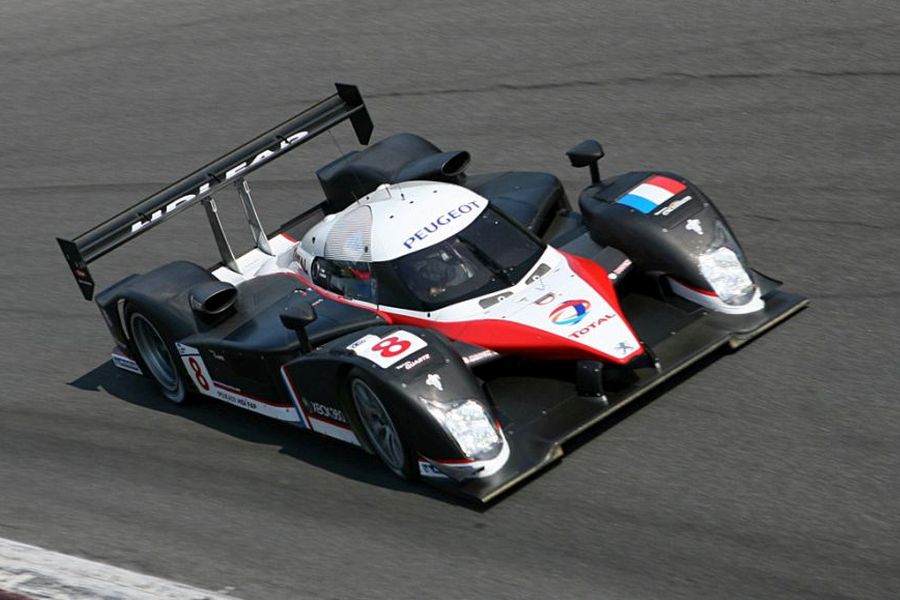
Victory in race debut at 1000 km of Monza in 2007
Winning the 2007 Le Mans Series
For the 2007 Le Mans Series season, Peugeot confirmed that the drivers of the 908 would be Nicolas Minassian and Marc Gene (in the #7 car), Stephane Sarrazin and Pedro Lamy (#8 car), while Jacques Villeneuve and Sebastien Bourdais would be added for the 24 Hours of Le Mans.
The Peugeot 908 HDi FAP made its race debut at the 1000km of Monza, the opening round of the 2007 Le Mans Series. The #7 car of Gene and Minassian took a victory in debut race. In the 2007 LMS season, Peugeot scored six wins in six races, three for each car, winning titles in Teams’ and Drivers’ championship.
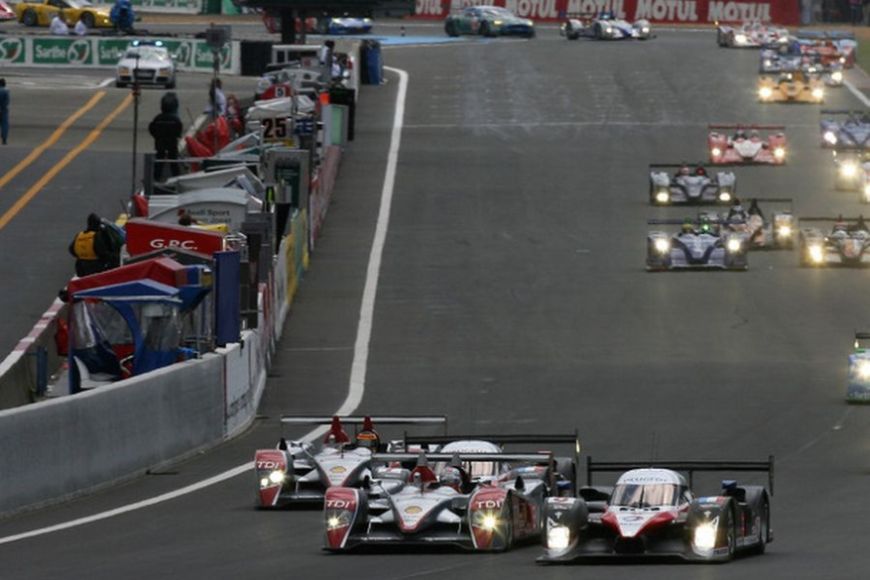
Audi and Peugeot at the start of 2007 Le Mans race
2007 Le Mans 24h: Audi – Peugeot 1:0
In the Le Mans Series, Peugeot was fighting against private teams. As Audi was participating in the American Le Mans Series, the first and only duel of R10 TDI and 908 HDi FAP happened at 24 hours of Le Mans in June 2007. Peugeot was faster during the official test on June 3 and again in qualifying before the race.
In the race, the #1 Audi was a winning car, rounding 369 laps around Circuit de la Sarthe. The #8 Peugeot finished second, ten laps behind. The #7 Peugeot retired due to oil pressure problems after 338 laps.
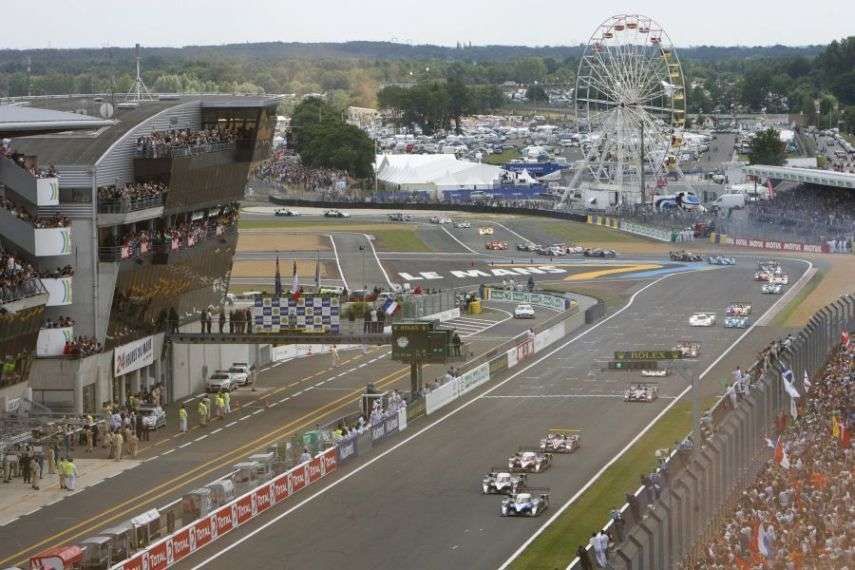
Start of the 2008 Le Mans race
2008 Le Mans 24h: Audi – Peugeot 2:0
At 2008 Le Mans 24h race, Peugeot was fighting with three cars against Audi, losing again. The #2 Audi won the race, Peugeot took 2nd, 3rd and 5th. Nicolas Minassian, Marc Gene and Jacques Villeneuve finished in the second place with #7 car.
They were joined on the podium by Franck Montagny, Ricardo Zonta and Christian Klien, who finished third in the #9 car. Drivers in the #8 were Stephane Sarrazin, Pedro Lamy and Alex Wurz.

Peugeot 908 HDi FAP at 2008 Sebring 12 hours
Peugeot goes to America in 2008
In 2008, Peugeot expanded their endurance racing program to some American races while Audi entered the Le Mans Series, so two diesel-prototypes was fighting all year long. At Sebring, the #07 Peugeot finished in the 11th place, setting the fastest lap time. Later in a season, Peugeot finished second at Petit Le Mans at Road Atlanta.
In the 2008 Le Mans Series season, Peugeot scored four wins in five races, two wins for each car, but at the end, Audi took championship titles in the teams’ and drivers’ standings.

Victory for Peugeot at 2009 Le Mans 24 hours
2009 – finally a victory at 24h Le Mans
After proving that they can beat Audi with four wins in the Le Mans Series races, the most important victory for Peugeot followed in June 2009, when French manufacturer finally won 24h Le Mans race. Peugeot entered a race with three cars while one older car was used by Pescarolo Sport. After 382 laps around Circuit de la Sarthe, David Brabham, Marc Gene and Alex Wurz scored a historic victory for Peugeot, the third for the manufacturer at Le Mans, 16 years after Peugeot’s previous win.
A triumph was even better as Franck Montagny, Sebastien Bourdais and Stephane Sarrazin finished in the second place. After winning ten Le Mans races in a row, Audi’s victorious streak ended with a third-place finish.

Peugeot 908 HDi FAP at 2009 24h Le Mans
Wins at Spa and Petit Le Mans, podium at Sebring
In the rest of the 2009 season, Peugeot repeated its participation at two American races and participated in just one Le Mans Series race, the 1000 km of Spa. At Sebring, Peugeot 908 HDi FAP was fighting against new Audi R15 TDI, swapping a lead few times. At the end, Audi was just 22 seconds ahead of Peugeot. Drivers in the #08 Peugeot were Stephane Sarrazin, Franck Montagny and Sebastien Bourdais.
At Spa’s LMS race, the #7 Peugeot won the race, driven by Nicolas Minassian, Simon Pagenaud and Christian Klien. Peugeot scored one more win that year, at Petit Le Mans, with Montagny and Sarrazin in the #08 car.
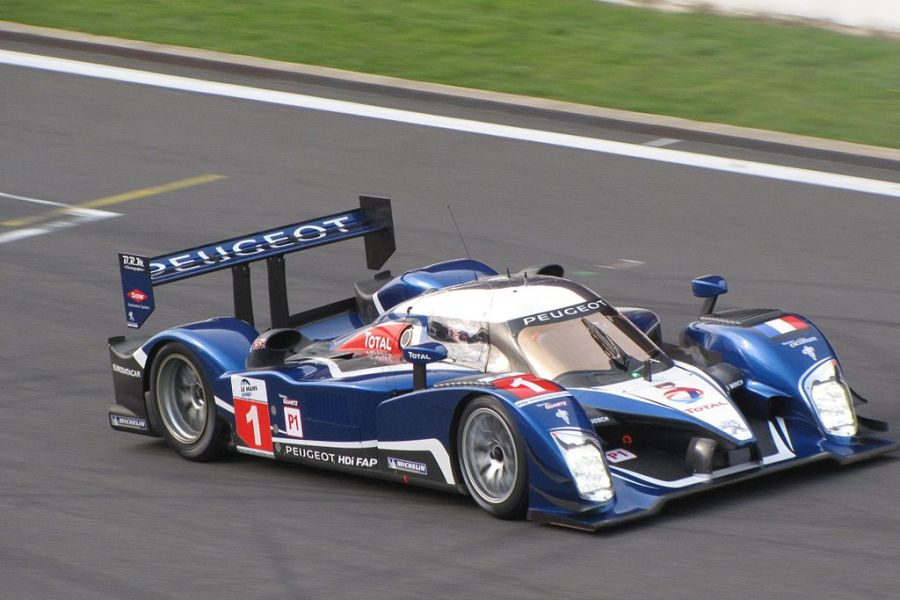
#1 Peugeot 908 HDi FAP in 2010
2010 – five wins in five championship races
The 2010 season started good for Peugeot, with a 1-2 victory at Sebring 12 hours. The winners in the #07 Peugeot were Marc Gene, Alex Wurz and Anthony Davidson. Peugeot also won the last round of the American Le Mans Series, scoring again a 1-2 victory at Petit Le Mans. The winners in the #08 Peugeot were Franck Montagny, Stephane Sarrazin and Pedro Lamy.
In the 2010 Le Mans Series, Peugeot participated in two races (Spa and Silverstone), winning both with two different cars. Winning drivers were Sebastien Bourdais, Pedro Lamy and Simon Pagenaud (Spa), Nicolas Minassian and Anthony Davidson (Silverstone). In November, Peugeot won 1000 km of Zhuhai, a part of the inaugural Intercontinental Le Mans Cup.
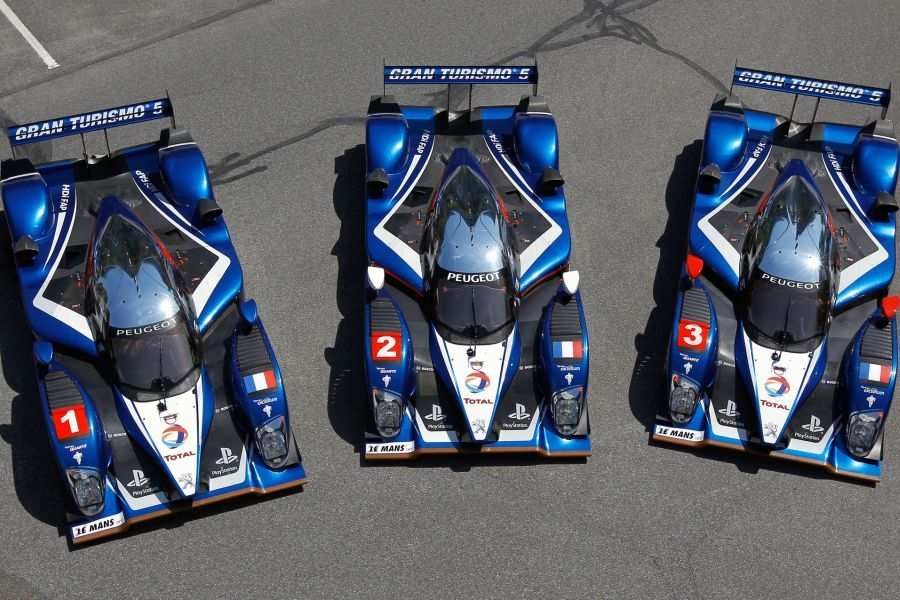
Three factory-entered Peugeots didn’t finish 24h Le Mans race in 2010
Four retirements at 2010 Le Mans race
Peugeot had a perfect score in championship races, with five wins in five races, but totally failed at 2010 Le Mans 24 hours. After taking four top spots in qualifying, with three factory-entered cars and one for Team Oreca Matmut, all four cars retired during the race.
The pole-sitting #3 Peugeot retired after only 38 laps due to suspension damage. Oreca’s #4 car made most laps, retiring in the last hour after 373 laps. Three Peugeot’s retirements were forced by engine issues. While Peugeot had a catastrophic race, Audi celebrated 1-2-3 victory for their R15 TDI plus.
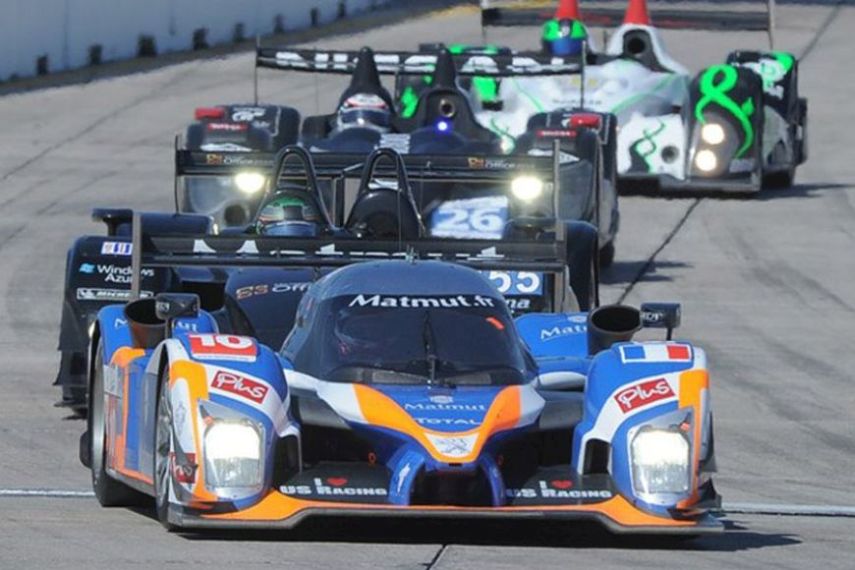
2011 Sebring 12 hours – last victory for Peugeot 908 HDi FAP
Smaller engine for new Peugeot 908 in 2011
For the 2011 endurance racing season, Peugeot introduced new prototype, simply named Peugeot 908. It featured a 3.7-litre V8 twin-turbo diesel engine. An old 908 HDi FAP was in use by Team Oreca Matmut, which scored a sensational victory at 2011 Sebring 12 hours, beating both Peugeot and Audi factory teams. Drivers in the victorious #10 car were Nicolas Lapierre, Loic Duval and Olivier Panis.
Team Oreca Matmut participated in three more Intercontinental Le Mans Cup races with 908 HDi FAP, including Le Mans. At 2011 Le Mans 24h, Audi won the race ahead of three Peugeot 908s and Oreca’s 908 HDi FAP in the fifth place. Peugeot factory team won the 2011 ILMC title with new 908 prototypes, winning five races, in which turned to be the last season of Peugeot’s endurance racing program.
The hybrid version of Peugeot 908 was already prepared for the 2012 FIA World Endurance Championship but the French manufacturer canceled its prototype racing program.
Peugeot 908 HDi FAP technical specifications
| Chassis | Carbon fibre monocoque |
| Length | 4,650 mm |
| Width | 2,000 mm |
| Height | 1,030 mm |
| Wheelbase | 2,950 mm |
| Weight | 925 kg |
| Engine | 5,500cc V12 HDi diesel twin-turbo |
| Power | 730 hp/1,200 Nm |
| Transmission | Rear-wheel drive |
| Gearbox | Ricardo 6-speed sequential |
| Front suspension | Double wishbones, push-rod actuated torsion bars and dampers |
| Rear suspension | Double wishbones, push-rod actuated coil springs over dampers |


